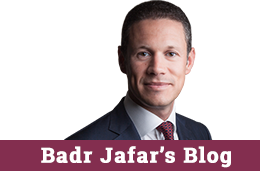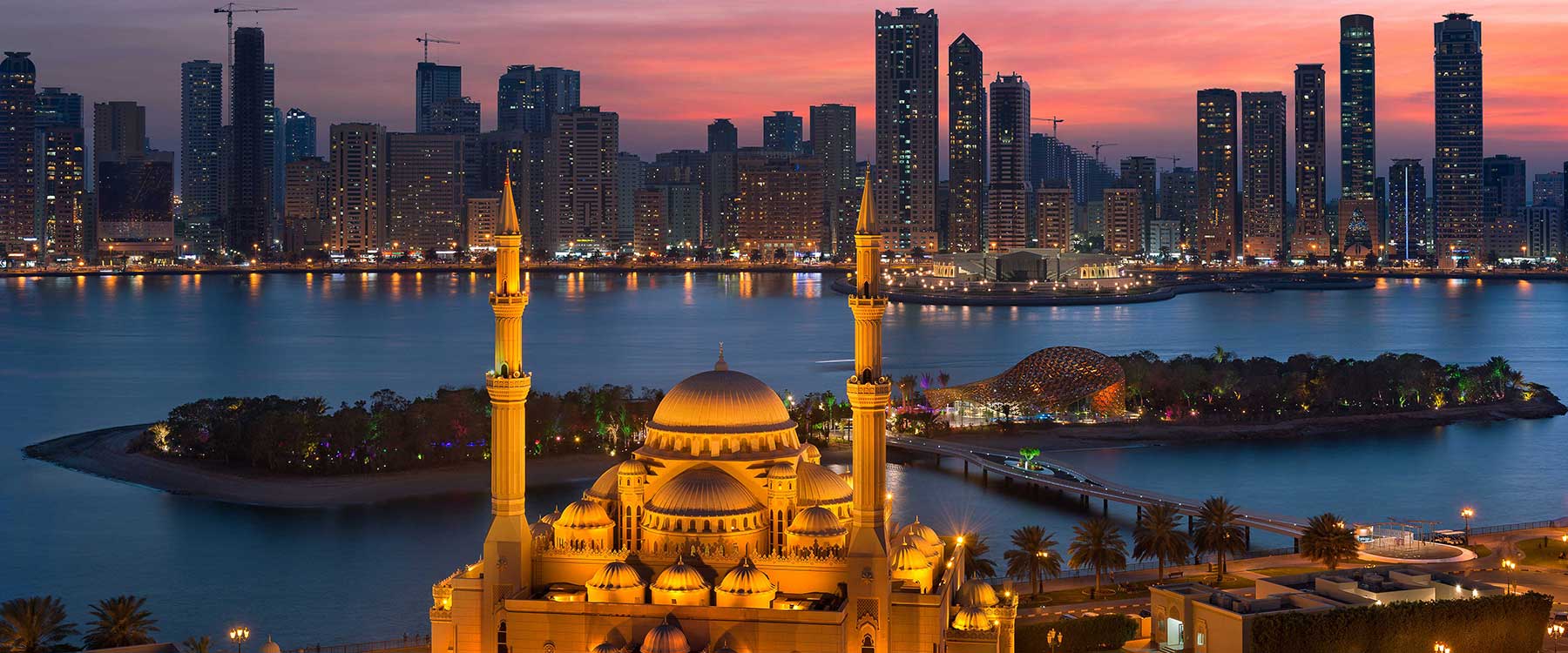An innovative emirate in touch with its heritage
I had the pleasure of being interviewed for a special report on Sharjah published by The Times of London in March 2018. The report features businesses, education and cultural leaders who are fostering innovation to build a bright future for the Emirate. Please find the interview here:
Peter Drennan: “Sharjah is a place that nurtures SMEs,” says HE Marwan Al Sarkal. But a challenge, he concedes, is retaining those businesses when they become multinational. Yet Crescent Group, one of the oldest private companies in the emirate, remains headquartered here. Why?
Badr H. Jafar: There are a number of factors that ultimately influence where a business bases itself – from hard facts and feasibilities to softer reasons that stem from a loyalty to the place you call home. From a strictly business point of view, I think Sharjah has a competitive advantage on a number of levels. The first one, which is something that I’ve been contemplating for some time, is a level playing field for businesses to thrive. Not only does this include the regulatory frameworks, which you need to rely on to operate, but also an equal opportunity to succeed. This extends beyond the business landscape, especially when you consider how active some of the governments here in our region are, with government entities inadvertently competing at times with business in various sectors. Having said that, Sharjah has always encouraged a level playing field, with the government being focused on the business of governance and developing a conducive regulatory and policy framework, and allowing businesses to be in the business of business. At Crescent Enterprises, we were lucky that we started our journey early on, and in the right place, with the opportunity to work alongside government in strategic sectors such as ports and logistics.
Secondly, and this is increasingly critical, is access to talent. Today, Sharjah is home to a melting pot of human capital, developed from the world-class institutions hosted at the Sharjah University City, which the American University of Sharjah (AUS) is a part of. [Editor note: the Sharjah Government has recently committed a further $500m to establishing AUS as the region’s premier research university.]. Being closer to these institutions and part of the Sharjah education ecosystem so that we can access that talent, is an important competitive advantage.
In addition, Sharjah is unique in that there is economic uniformity across the board. In fact, Sharjah today has the most diversified economy in the GCC, with no single sector making up more than 20% of GDP. That indicates a large basket of high-potential sectors to choose from and equal opportunity for each individual industry to thrive and grow. This is evident within Crescent Group’s ecosystem as well, which mirrors the growth story of Sharjah. As a group, we started out in upstream oil and gas 47 years ago. As Sharjah grew into a more diverse industry base and required more services over time, we also expanded into those industries and sectors. Today, the Crescent Group comprises Crescent Petroleum and Crescent Enterprises, with 28 subsidiaries and affiliates operating in 21 countries and employing more than 6000 people – and proud to be a homegrown Sharjah success story, enabled by the conducive business environment and the vision of the UAE to grow and diversify the economy.
Ultimately, one shouldn’t underappreciate the loyalty factor that we have toward Sharjah. I think this is very much a part and parcel of our corporate culture and DNA.
PD: CE-Creates is an incubator for start-ups that generate a sustainable social impact. At the Sharjah Entrepreneurship Festival last month, Crescent Enterprises announced the formation of CE-Ventures, its corporate venture capital arm, with plans to invest up to $150 million over the next three years. Sector agnostic, half of the funds will be dedicated to MENA-based ventures. What sort of investments are you looking for?
BHJ: Taking a step back, just to explain the genesis of the whole Crescent Group, it started out 47 years ago in upstream oil and gas with Crescent Petroleum. Over the years, as a family business, we started to become exposed to other sectors, and this happened organically. I formally joined the family business 16 years ago, in 2002 to pursue expanding our project footprint at Crescent Petroleum. At the time, I also felt the need for formalising our diversification strategy by launching Crescent Enterprises as a separate entity to operate in a diverse range of strategic sectors.
Crescent Enterprises has gradually evolved into four main business verticals:
The first is CE-Operates, which includes our operating businesses. These are wholly or majority-owned businesses, such as Gulftainer that is in ports management as the largest privately owned container terminal operator in the world, Momentum Logistics that is a 4PL logistics provider, Uruk that is in power and engineering, and Gama Aviation in business aviation.
Then we have CE-Invests, our strategic investment arm that invests predominantly in private equity. There are around 10 private equity firms that we have invested in all as strategic investors, either from being part of the General Partner (GP) entity, represented on the Boards or as a member of their investment advisory committees. In addition to this, we also pursue co-investment opportunities across the various sectors that these private equity houses are exposed to.
More recently, we have been actively involved in the venture capital space. This encompasses early stage through seed investments and all the way through Series C and D growth stage funding. To formalise this rapidly growing part of the business, we launched our venture capital arm, CE-Ventures, capitalised at $150 million. We already have a portfolio of around 23 individual investments, which includes everything from medical and logistics technology to food technology and other emerging technologies like Artificial Intelligence (AI) that have applications across sectors. For example, we invested in a seafood e-commerce platform in India that has disintermediated an inefficient supply chain and is growing at a rapid pace.
Finally, I felt that there was a need to continue the legacy of entrepreneurship, and keep that spark alive, which is very important for a family business to survive across generations. To do that we set up an internal incubator called CE-Creates, which develops early-stage concepts into economically viable and scalable businesses with a significant social impact. At any given point, there are 20 to 30 concepts in the pipeline, but of course, only a small percentage actually materialise, which is natural.
PD: How long has this unit been operational?
BHJ: CE-Creates was established three years ago, and has already launched two businesses. The first is Kava & Chai, a homegrown coffeehouse brand that seeks to revive Arab traditions and tastes. The second is Shamal, a line of specialised industrial clothing for outdoor labourers, which was in the R&D phase for three years, and is currently being piloted in regional markets. This concept stemmed from the fact that industrial uniforms are standard across the world, and not for purpose or suited to the extreme climate in this region. Going back to the drawing board, we worked with a product development company in India to combine material technology with existing cooling fabrics currently available in the market, to create a specialised clothing line for outdoor labourers.
At CE-Creates, we place a great deal of importance on the social purpose behind each business, regardless of the sector it operates in. Additionally, our aim is to create businesses that can transcend borders, with relevance both in the region, as well as a strong potential to go global.
With Shamal, I think it’s very clear where the social purpose is. With Kava & Chai, our purpose was to bring the culture of coffee and tea back home, but also take it to the rest of the world and reintroduce coffee through the true power of the coffeehouse. Kava & Chai really addresses the dichotomy of technology, where on one hand, we’re supposedly more connected, but on the other hand, we’re becoming disconnected. It is a space that celebrates collaboration, community and fuels innovation. The two outlets that were opened recently in Dubai and Sharjah have a speaker’s corner and people reading poetry, which are iconic parts of the traditional coffeehouses. Our music is also curated locally. When Kava & Chai launches outlets globally, the idea is to blend elements from that region with aspects from the traditional culture of the coffeehouse. For example, an outlet in Rio will have a local flare to it, but will also bring the true culture of the coffeehouse back to where it should be. You can see that there are social dynamics behind this business – we are not trying to take on other coffee chains, but reinforce the spirit of humanity and culture associated with the coffeehouse. This social vision extends across our businesses.
Similarly, our corporate venture capital arm, for example, is not necessarily bound to any timelines for exit, compared to traditional venture capital which is very returns-driven. We’re trying to build long-term value. Sure, generating returns is an important aspect because that’s where the sustainability of investments come in, but it’s not necessarily about the exit. When you’re having conversations with entrepreneurs or early stage businesses, and you say, “hey we’re in this for the long-term,” that language is far more inviting to them than the money manager who is saying, “what’s your exit strategy?” That difference is where I think we have a competitive advantage.
At a recent event I attended with the CEO of IBM, she pointed out that the first wave of innovation favoured the young start-up community, because it used the network effect, whereas now data and expertise are the real currency. This new environment will favour what she called the legacy businesses because data is now available for everybody to use. However, the expertise is important. This is what we’ve attempted to do with CE-Ventures, which is investing within the technology space, in our primary sectors of expertise, whether it is logistics, energy, aviation, or finance. It’s about marrying the data economy with this expertise, which we hope will generate a multiplier effect. It’s an exciting journey.
PD: You formally joined the family business 16 years ago, determined to apply a ‘business with a soul’ philosophy that would bring about positive change. Is that how it has manifested itself, these businesses with a bold social component?
BHJ: Yes, I fundamentally believe that there does not need to be a trade-off between profit and purpose. It’s not a zero-sum game. The question, however, is how do you create a culture that facilitates both profit and purpose and allows them to peacefully coexist? It’s doable. Perhaps it is more difficult to do retrospectively, and looking back I often think about what I could have done differently with a particular business line. Now that we do have the luxury of building new businesses from scratch, the focus is on building this culture. I want to make sure that whatever we do has a socially defined purpose.
Even at an individual level, I believe wholeheartedly in the saying that poverty is not only a lack of money, it’s a lack of sense of purpose. I believe the same philosophy can be applied to a business. A business without a sense of purpose is a poor one, regardless of how much profit it might be making. After all, what purpose is it serving other than generating financial benefits? Someone else might take those financial benefits and apply them toward a good cause, but what’s the heart and soul of the company? It’s soulless if it doesn’t have a strong and defined purpose. Does it have to be one type of purpose or one type of soul? No, you can generate impact across the board. We have now done that within the family business, where in many ways we were doing it anyway, but I wanted to see everything that we did to be seen through this lens of a deeper purpose. That sort of journey of discovery is never easy.
PD: In another quote you said, “I have always thrived on diversity, I can’t imagine a world where I would wake up doing the same thing each day.”
BHJ: Yes, that’s critical for me. I think especially in this day and age, the era of the expert is rapidly coming to an end.
Caroline Steiner: The golden age of the polymath?
BHJ: Sort of, yes – I was always fascinated by how polymaths of the past were able to combine lessons and skills from many different disciplines and create this explosion of innovation – the arts were always central to that. Building the economic and socio-economic case behind embracing arts and humanities is something I’m very keen on promoting, not just for the aesthetics of it, but for the innovation potential – especially if you leverage the arts in a proper way. Many of the polymaths that I’ve studied were artists before they became scientists. This comes back to the diversity aspect. The age-old model where you need experts to be the go-to for a certain subject matter or for a certain amount of information or data, is slowly becoming outdated. All that information is available in the cloud today, where it is instantly accessible. The question is what are we teaching people? We need to be teaching people how to live in a world of diversity, how to accept diversity, both at a business level but also at a cultural and social level – and that takes a different skill set. Some people would say that if the society you’re living in doesn’t embrace these values it’s much more difficult. I accept that. This is where the role of parents becomes that much more important than those of school teachers because these value systems really start at home. So yes, my day in the office is pretty diverse. It keeps it fresh, but honestly, I see it as all part of the same canvas – every aspect really does live and feed off each other, which is nice.
PD: The Pearl Initiative was set up to foster a culture of transparency and accountability across the region’s corporates. You have spoken passionately about the importance of companies adopting a robust corporate governance model in order to be able to compete internationally. What impact has the Pearl Initiative had and have you achieved what you set out to do?
BHJ: The Pearl Initiative’s goal and ultimate mission is really a compass point. What we’re striving to do is create a culture of transparency and accountability because it makes business sense.
Now, the business case differs as you go across sectors and geographical territories, so there’s no cookie-cutter approach. One needs to apply and contextualise it even within cities across the Gulf. The Pearl Initiative is focused on the Gulf, but even within the region, the narrative in Dubai is different to that of Sharjah or Abu Dhabi. Similarly, there are differences between Jeddah and Dammam. One has to adopt a very localised approach. In this respect, the Pearl Initiative has an advantage because we’re by the region for the region. We were created by a group of business leaders who are part of and therefore understand the business context and the culture.
The Pearl Initiative tries to contextualise governance from a business perspective, which is very important. We’re not a regulator – we’re not there to tell people what to do, or call out businesses for their lack of governance. In fact, we like to recognise the entities or individuals who are really ahead of the curve in terms of thinking about corporate governance. That’s when others start to listen and think “maybe that’s what I should be doing as well.” It’s about naming and faming, as opposed to naming and shaming! That’s how you generate change, especially in a relationship-based society. You have to be smart.
The Pearl Initiative sees change as a continuous process. We have a number of programmes looking at the governance of non-profits, governance in SMEs, and more recently, we’ve launched a governance in technology programme as well. Corporate governance challenges within the tech sector is a global phenomenon because businesses grow so fast and they haven’t had the opportunity to embrace governance and build this resilience within their business models.
The Pearl Initiative also pursues programmes supporting the business case behind diversity in the workplace, including across gender, age and ethnicities. These dynamics are all part of overall best practice corporate governance and I strongly believe we have an opportunity as well as responsibility to implement within our business landscape across the Gulf Region.
PD: Arab youth is educated, but are they entrepreneurial? Is enough being done to foster a culture of innovation and entrepreneurialism in Sharjah, the UAE and the Middle East?
BHJ: The contribution and impact of small and medium enterprises (SMEs) on the economy, national GDP, and sustainable job creation is crucial. In the UAE, for example, SMEs account for over 60 percent of total GDP and constitute over 94 percent of operating companies. Sharjah, much like the other emirates, has made economic diversification a priority and is home to more than 16 per cent of the UAE’s SMEs. Our burgeoning entrepreneurship culture owes primarily to the emirate’s competitive supply chain and the commendable efforts of the government through initiatives such as the Sharjah Entrepreneurship Centre (Shera’a). Recently, Sharjah has also developed its two economic free zones to support the growing number of SMEs, especially in the manufacturing and industrial segments. Sharjah Publishing City, which the government has recently inaugurated, is also intended to support the growth of the book industry by providing publishing firms and institutions with a multi-amenity base from which they can expand their businesses. These efforts will continue to develop Sharjah into a hub of innovation and entrepreneurship.
However, even as we witness the rapid proliferation of SMEs and start-ups, in real terms we still fall behind in aspects such as internationalisation, start-up skills and process innovation in the region. If we look across the MENA region, SMEs account for around 30 percent of the private sector employment and between 14-30 percent of GDP across the Gulf. This figure is low in comparison to the UAE, as well as OECD averages where SMEs account for half of all private sector employment and their contribution to GDP is 55 percent. As we strive to bridge this gap, we need to regard the important role budding entrepreneurs and SMEs play in impacting the socio-economic dynamics of the Middle East. To this end, start-ups and small businesses must be honed to grow from solution-takers to becoming solution providers in the larger sustainability and governance context. Governments are taking decisive steps to address this, especially through National Agendas – such as the UAE Vision 2021 and Saudi Vision 2030 – that seek to increase SME contribution to GDP. However, the Private Sector can also play a pivotal role in further boosting this ecosystem and improving the investment appeal of the region by encouraging the growth of start-ups that integrate creative capabilities and sustainable foundations to thrive in a digitised economy.
The Arab Supply Chain Initiative, supported by the World Economic Forum and championed by Sheikha Bodour bint Sultan bin Muhammad Al Qasimi, the Chairperson of the Sharjah Investment and Development Authority (Shurooq), prioritises this urgent need for private sector-led start-up development. The Initiative, which Crescent Enterprises is a part of, calls on large companies to allocate 10 percent of procurement-spend annually to entrepreneurs and SMEs by 2020 – thereby increasing their participation in the economy, and providing greater opportunities for the growth and success of small businesses.
Crescent Enterprises mobilised this vision three years ago, with a target to increase SME participation in our global supply chain to 20 percent. This included small but effective changes, such as a policy that required at least one-third of bids for procurement orders to be from SMEs and breaking down large contracts into smaller parts to allow SMEs to bid for contracts as per their capacity and specialisation. The outcome reached well beyond our expectations – so far, our total SME procurement is at 29 percent, up from 7 percent in 2014, surpassing the target way ahead of time. We have also realised the genuine benefits of this initiative, and have revised our target to achieve 35 percent SME participation by the end of 2018.
These capabilities are what differentiates global innovation hubs as sources of economic value and meaningful change. Let us remember technology doesn’t drive change, it enables it. At the end of the day, technology is a tool and we, the connected people, are the real agents of change – and time will tell whether we have used these tools for the collective betterment of society – or not. So, while Silicon Valley has worked wonders for many, what I’d really like to see, and believe our region needs, is a new breed of human-centric innovation hubs, or more concisely called ‘Purpose Hubs’ – that can harness the power of business innovation to inclusively serve humanity and our habitat. We, therefore, need to realign our business models toward a new paradigm of entrepreneurship that can deliver lasting social, cultural and economic benefits. With this model in place, we stand a better chance at long-term success by creating strong brands of global standards, generating jobs and developing essential skills, and fuelling the transition of the country from being simply early-adopters to a nation of innovators and exporters of technology.
PD: ‘We continue to aggressively invest in exploration as the lifeblood of our industry.’ Where is Crescent Petroleum seeking to grow its upstream activity and what potential do you see in unconventional reserves?
BHJ: For Crescent Petroleum, current oil prices seem to be reflective of fundamentals. Even in the face of significant oil production growth from US, tight oil supply is only just keeping pace with growing global demand. Demand from major consumers such as the US, China and India remains at record highs, and liquids inventories continue to fall to average historic levels. The global economy appears to be in good health, with positive economic indicators emanating from the US, China and the Eurozone. Meanwhile, compliance with the OPEC and non-OPEC cuts remains consistent, and global supplies are operating at 98 per cent of productive capacity, which leaves very little room for a supply-side shock.
Our view is that an oil price approaching $70 per barrel is a good thing for the stability and health of the global oil market, and provides us with opportunities to increase investment, particularly in low-cost environments like our own markets in the UAE, Iraq and Egypt. In particular, we see huge opportunity in the gas sector as our region’s power needs continues to grow at a rapid pace, and as we diversify our economies with downstream diversified industries, and so we look forward to increasing our own gas production to meet the region’s growing energy needs.
PD: Gulftainer has ambitious expansion plans and seeks to become one of the world’s top six container-terminal operators. A milestone was achieved when Gulftainer won the Port Canavarel concession. How significant was it to be the first Middle East-based company to manage a private port facility in the US and what expansion plans does the company have?
BHJ: Gulftainer, which is a subsidiary of Crescent Enterprises and one of our anchor operating businesses, was established in Sharjah to manage the first container terminal in the Middle East. Since then, it has developed the knowledge, capacity and efficiency to grow into a global ports and logistics business, with operations spanning five continents. Our decision to enter the US port management market was a significant milestone for us, making us the first port management company from the Middle East to operate in the US, and allowing us to explore the massive opportunity opening across the country. In fact, the American Society of Civil Engineers in its 2017 report estimates that the US needs to invest $3.6 trillion by 2020 to maintain its current infrastructure in a state of good repair. We, therefore, see substantial potential for infrastructure investment in the US.
As we identify new opportunities for growth across our global portfolio at Gulftainer, we are looking to expand capacities in existing ports as well as enter into contracts at new ports. In addition to the US, we see a lot of potential in global markets including Southeast Asia, Africa, South America, and of course the Middle East. We are also focused on constantly investing and innovating in order to adapt to evolving trends and are heavily focusing on technology, which allows us to benchmark our operations against best global practices.
—
You can find the complete report here

 Tweets by @BadrJafar
Tweets by @BadrJafar





Nice job — I was so, so impressed by Sharjah on my recent (and all too short) visit for the Family Business conference. How can those of us outside of Sharjah help?
Norris
Thanks Norris. Make sure you come back soon!